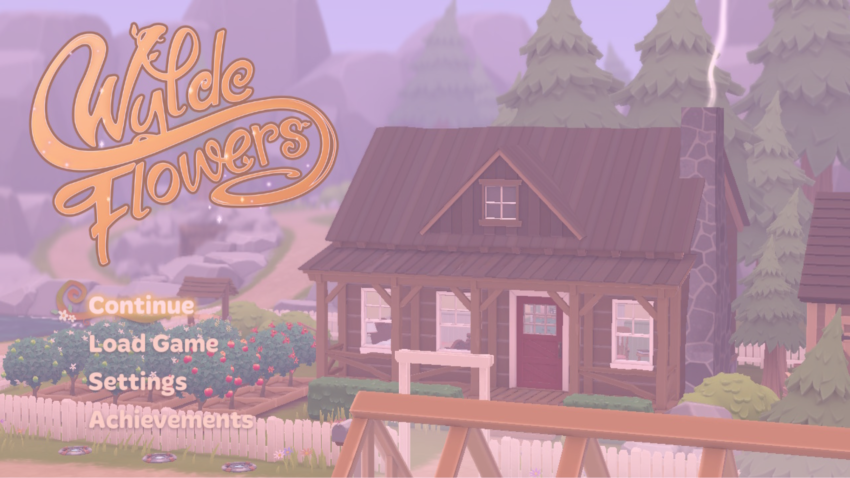Welcome to this Wylde Flowers review. We were not given a review code for this title.
This review may contain minor spoilers for gameplay and story beats, though I always try not to reveal any major plot twists or surprises.
Wylde Flowers is a magical life and farming game that fits snugly into an emerging microgenre that I like to call “witchy sims.” (I’ve also heard “cult cozy,” as a broader umbrella term, which I love.) The game opens with a tale as old as time: a grandchild moves away from the city to tend to their grandparent’s old, rundown farm. And that’s about where the similarities to other farming sims end and Wylde Flower’s unique blend of magic and heart begin.
Meet Tara Wylde, a recently laid-off editor from a nameless city publication who has decided to move to her ailing grandmother’s farm to help out. Grandma Hazel Wylde is a widow, a small farm owner, a pillar in the community of Fairhaven—and, oh yeah, she’s also a witch. Wylde Flowers combines everything you love about farming simulation games with unexpected elements of magic, mystery, and folklore seamlessly woven throughout.
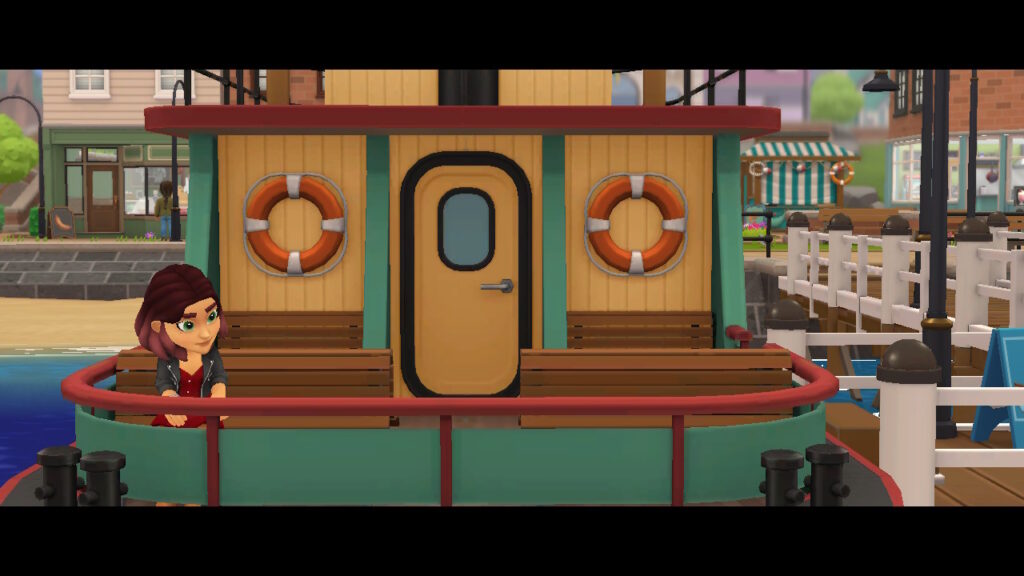
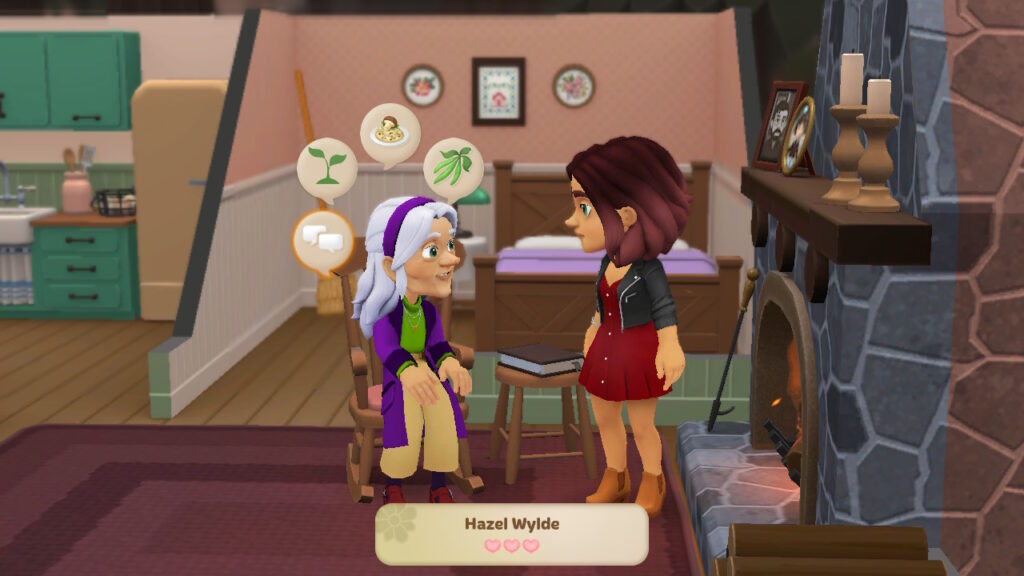
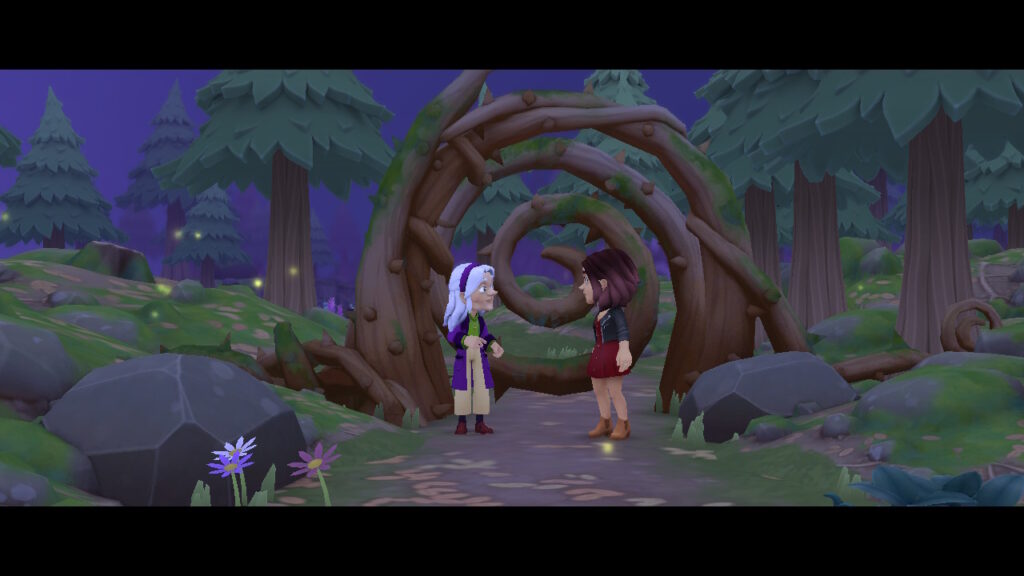
In a small village like Fairhaven, anything odd or unusual is treated with suspicion. Including the reports of a cloaked coven sneaking through the forest at night. While Tara and the other witches mean no harm—and in fact work to protect the community—the wary townsfolk are quick to turn against what they don’t understand. In tandem, the coven is very protective of their secrets, preferring to perform witchcraft in the dead of night rather than trust residents who are their daytime friends and neighbors with the truth. This tension serves as the main engine of the story, with Tara caught squarely in the middle. It was her grandmother’s wish that she try to unite the two disparate groups within Fairhaven—but can she, as a newcomer herself, hope to succeed?
The message of “fearing what we don’t understand” is the perfect metaphorical bridge for what many marginalized communities experience in real life. But Wylde Flowers itself champions diversity and inclusion in a way I rarely see in this genre. There are queer relationships that go beyond every romance candidate just being “player-sexual”; there is nonbinary representation in feisty butcher and bachelorex Kim; there are a broad range of ethnicity that, rather than just being background noise, are felt in the language, recipes, surnames, and cultural stories of each character.
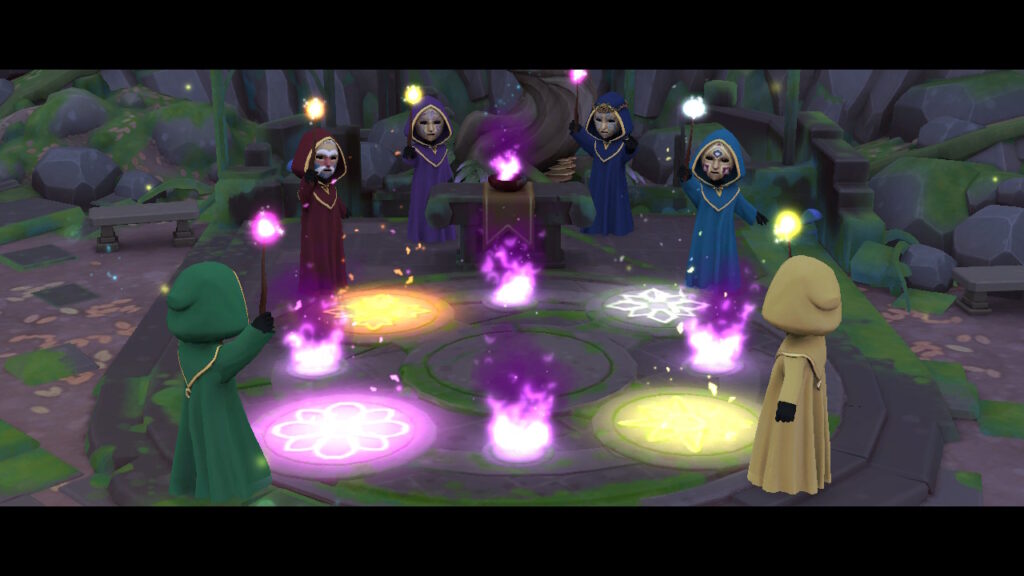
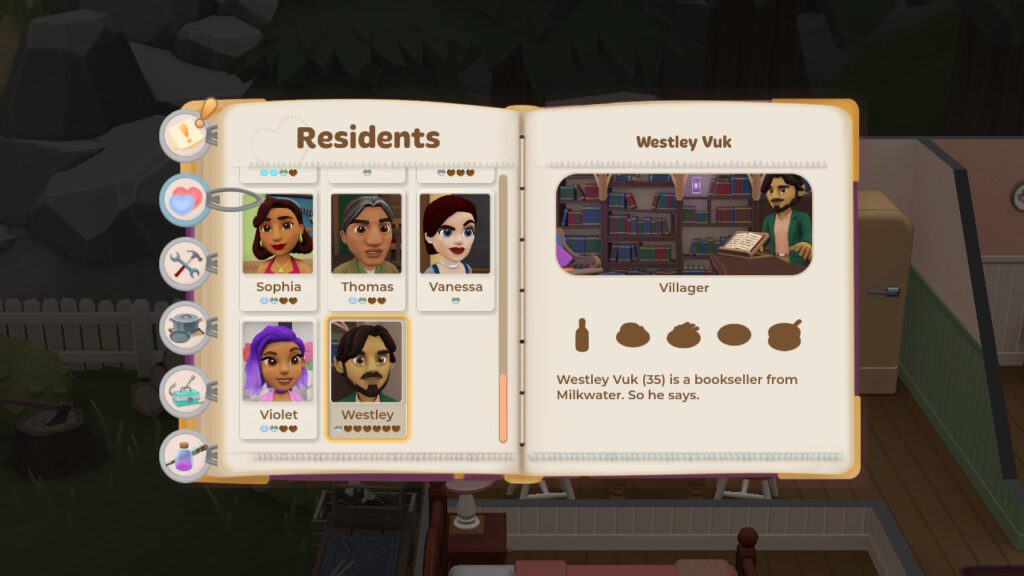
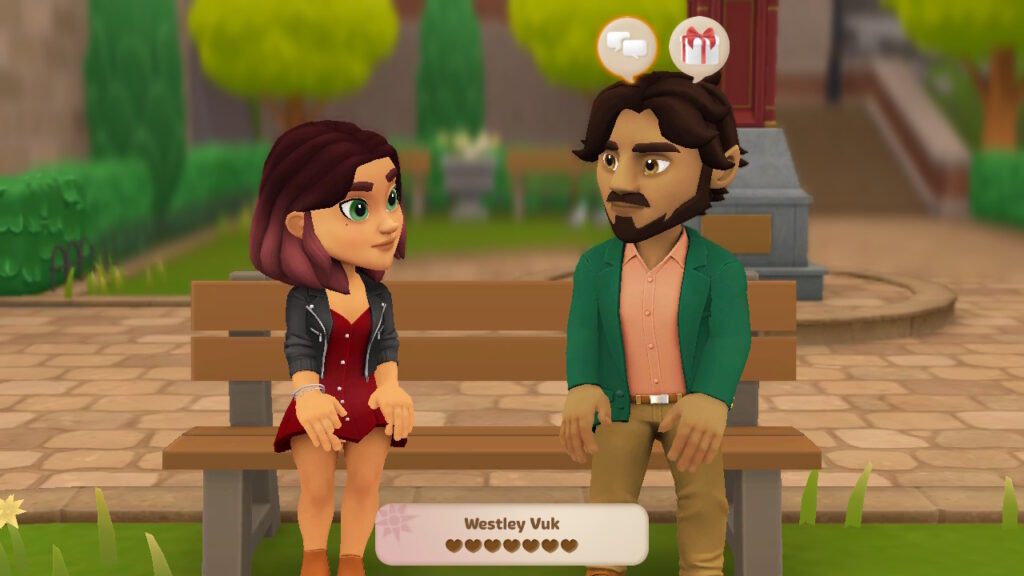
Some players might bemoan the lack of customization for Tara, from whose POV you will always play. You can eventually, with a bit of work, unlock new outfits but her name, backstory, and gender are fixed. However, I think the RPG elements of the game are part of what makes it so special. Lesbian characters are allowed to talk openly about their preferences and have an interest in one another outside of Tara’s romantic storyline. So much of the banter with Amira, Kim, and Giva is an extraordinary delight simply because the writers don’t have to hold anything back. You are empowered, however, to choose dialogue options that imply the sexual identity of your choice.
This is quite (pleasantly) different from games that have to downplay queerness for the sake of ensuring standard dialogue and cutscenes don’t interfere with the player’s custom character choices. Hearing queer doctor Amira make a banger of an “all lesbians know each other within six degrees of separation” joke was a welcomed laugh out loud moment, one made possible by a game that allows Amira to be openly gay rather than ambiguously player-sexual.
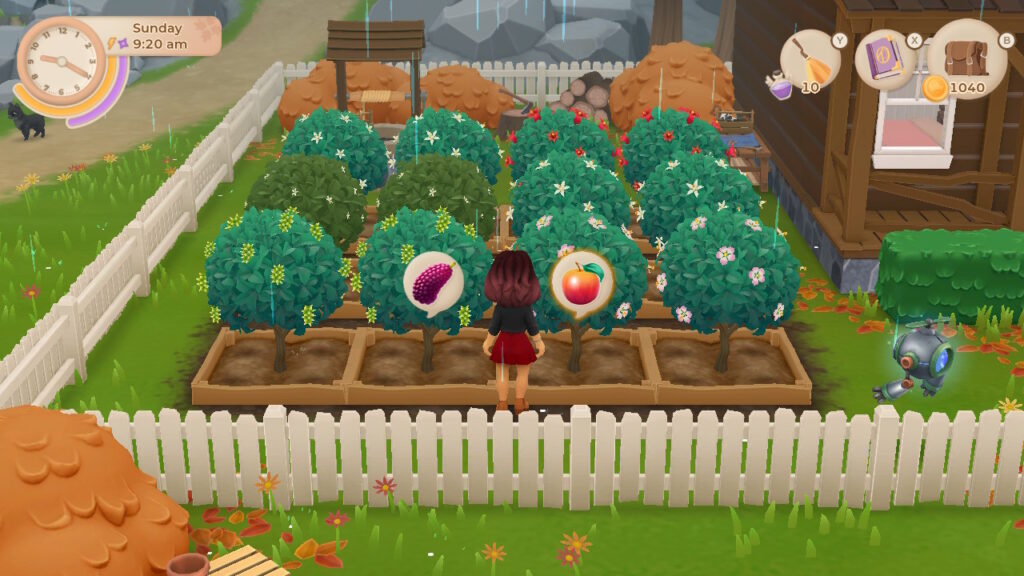
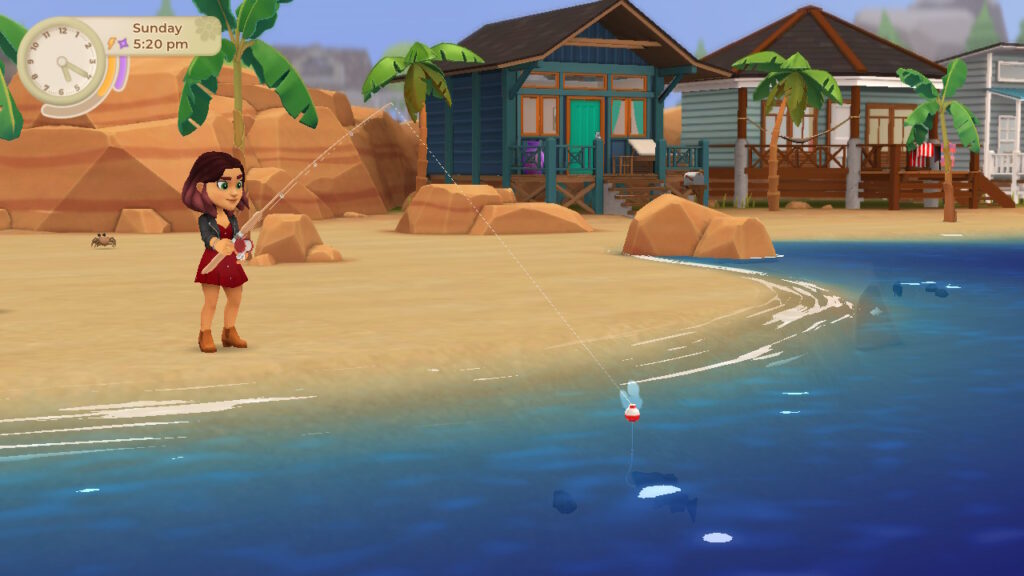
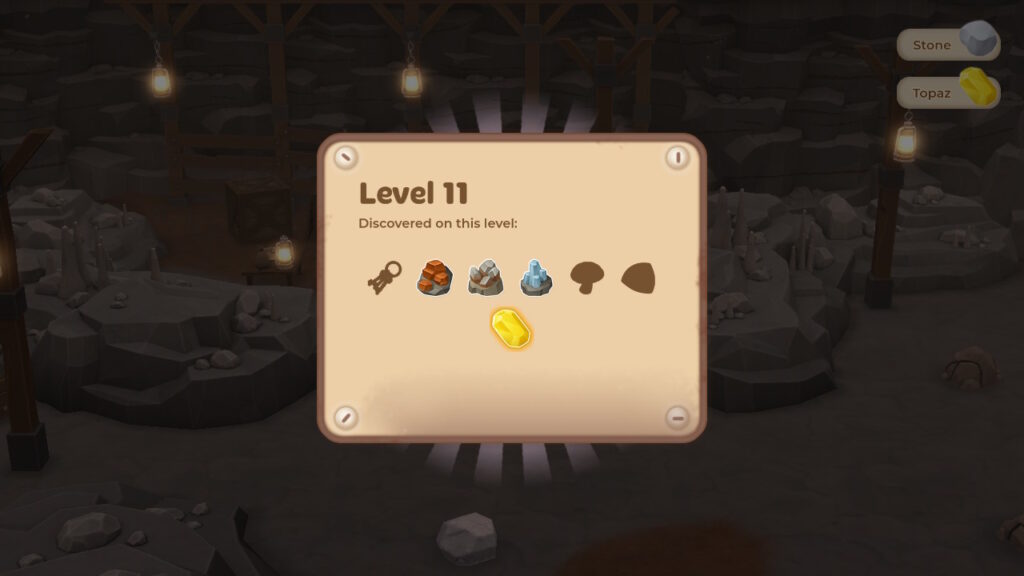
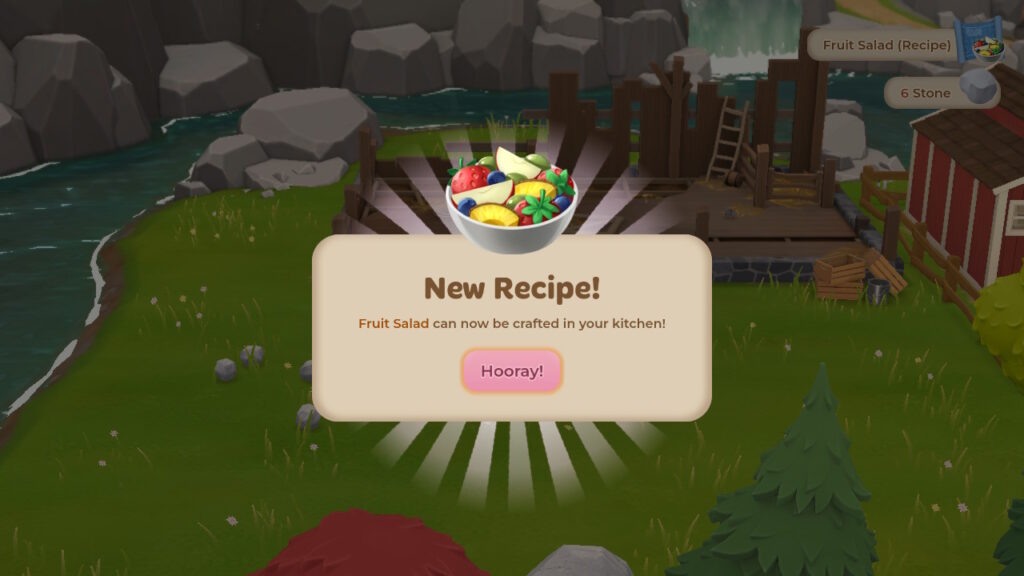
As far as gameplay goes, you will spend your time gathering resources, constructing farm buildings, planting crops, mining for ore, fishing by the ocean, and practising your magic. The magical elements of the game—mainly materializing as spells and potions—both help to move the story forward and accentuate your farm work. You can cast spells to auto-collect wood and stone, increase your movement speed, freeze time, summon rain, and pick locks, to name a few. Likewise, potions can increase your crop yield, speed up grow times, increase NPC affection, unveil townsfolk’s favorite gifts, and so on.
The deployment of magic is pretty evenly split between “wow, what a cool idea that improves gameplay quality-of-life” and “meh, that feels like filler.” There are some spells and potions that I really only needed to use once and then they were forgotten about forever. Oddly, you can eventually unlock robots to assist with farm chores where additional spells/magic would have made more story sense. Still, the witchy elements make the game unique and offer additional ways to strategize and optimize.
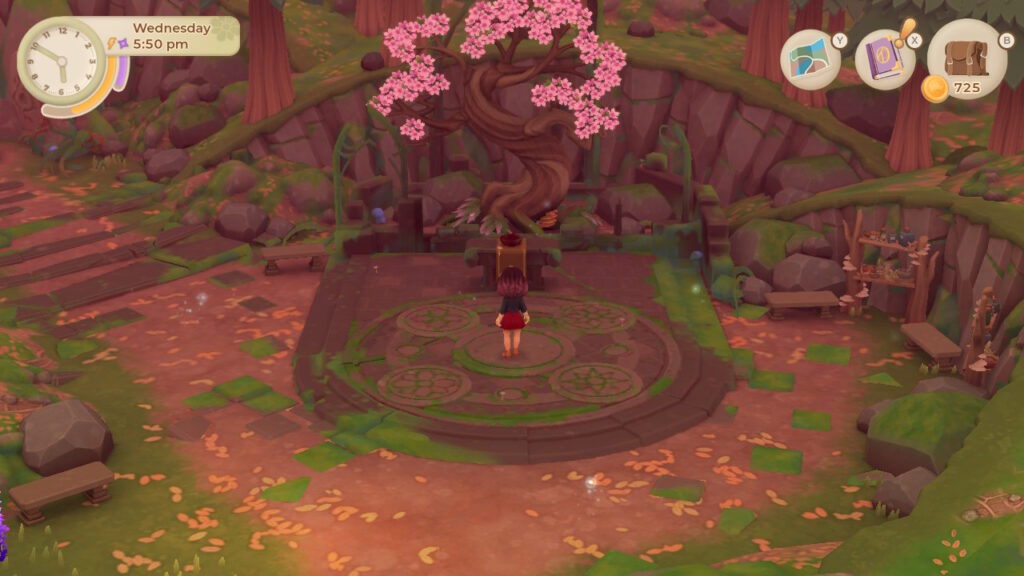
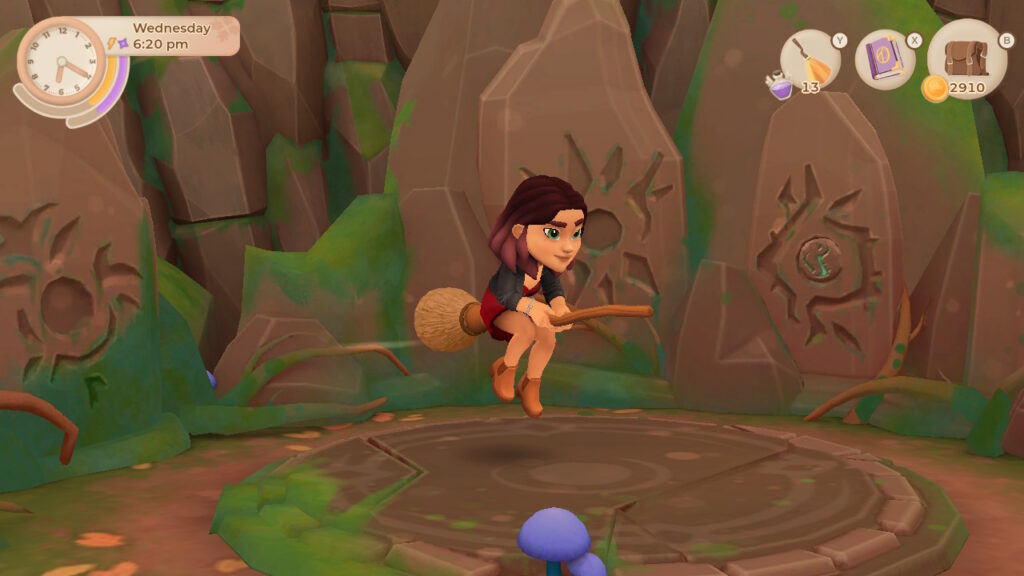
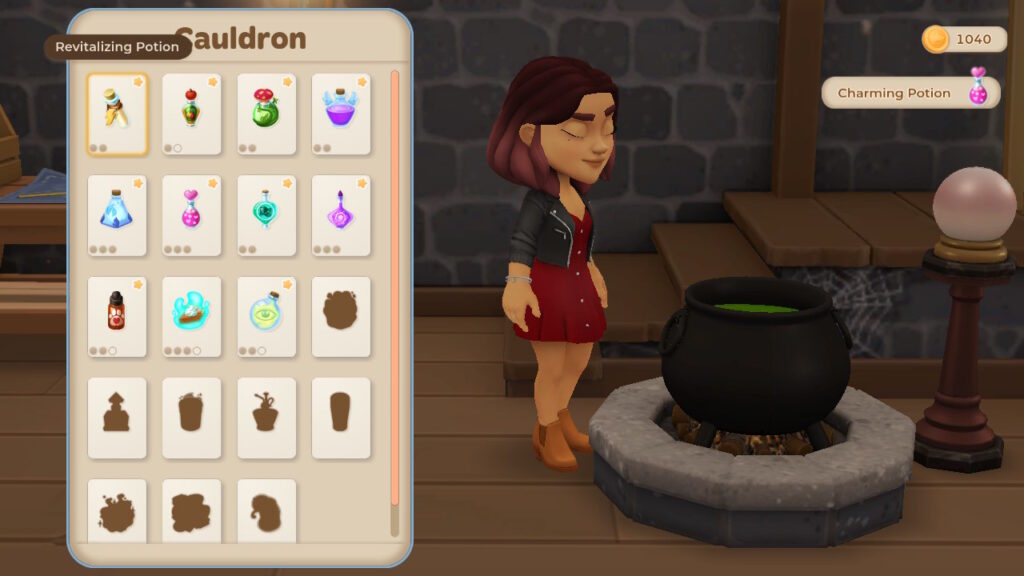
In an interesting move, spells are also what’s needed to progress the seasons. There isn’t really a day of the month counter, just day of the week. Spring ends when you end it (and when it becomes story appropriate.) I didn’t mind this anti-calendar approach but I can see how it might be polarizing for players. I rather liked being able to extend a season by a few days to harvest my final few crops before they wilt. The game will, however, get increasingly stern about prodding you to season-shift if you hesitate for too long, so say bye-bye to the dream of an endless summer.
Having flexible season lengths compliments the difficulty of the game, where resources can be scarce and gold reserves fleeting. Sometimes you need an extra week of spring to stock up on wheat or harvest season-specific forageables. While I welcomes the grind of this challenge, the developers did eventually retcon this by providing an easy money management method via selling fish sticks to the local diner at a more-than-generous rate. You can also alter the passage of time from easy, normal, or hard speed—another way the game ensures accessibility for those who need it.
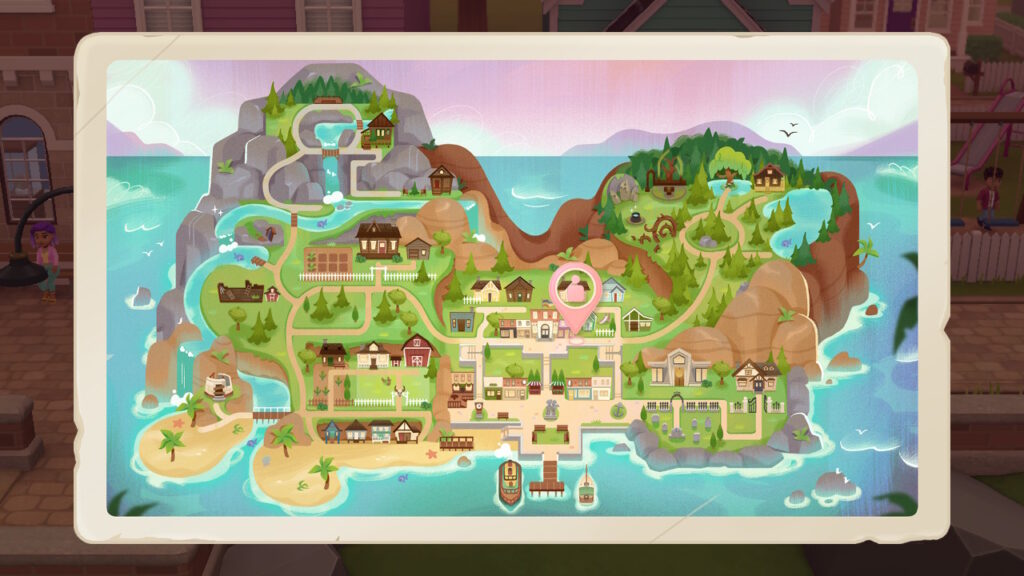
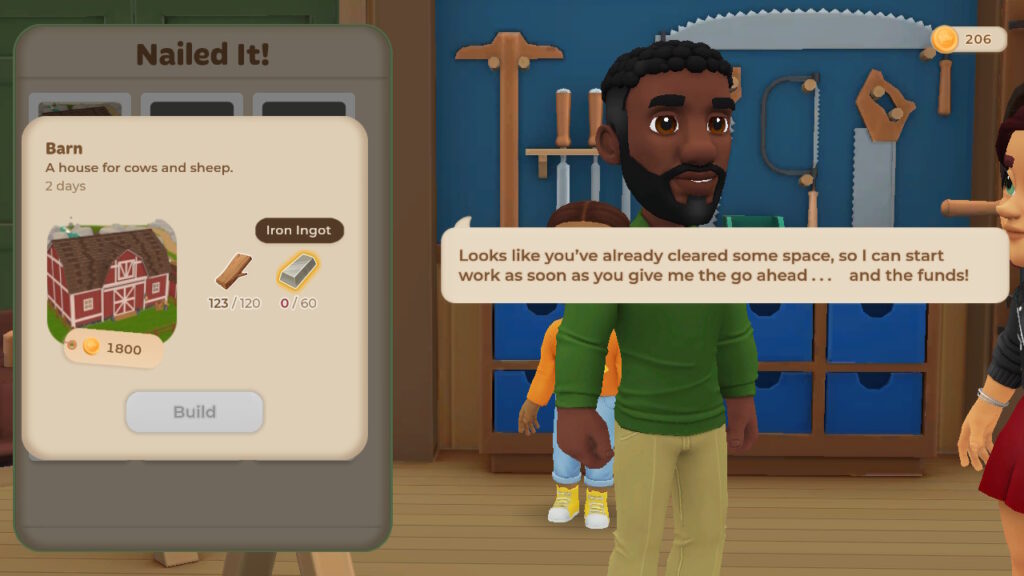
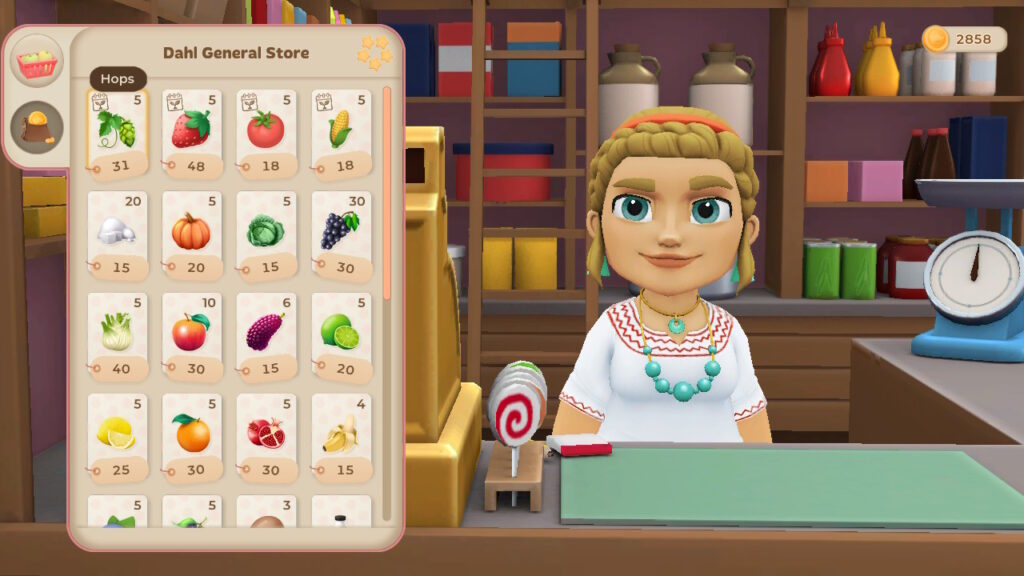
All this to say: you’ll want to be resource smart when hoarding the seasonal veggies you need to, say, make Westley’s favorite pork roast dinner. Seasons change according to the story, so you can’t really depend on “[##] more days until I can grow green beans again.” This is particularly critical because you can only give NPCs homemade meals/snacks as gifts. No more handing someone an egg or dandelion and running off all self-satisfied! While arguably more realistic, this means players will have to plan ahead and stock up on what they need most.
When first released, Wylde Flowers had no end game content; it lasted from sprint to spring and then it was over. The developers from Studio Drydock have since amended this (+ more) so you can spend some additional time after the story wraps up romancing your favorite villager or unlocking every collectable. This is certainly a welcomed change, as I remember feeling disappointed that I would only ever see one fall, autumn, and winter. But now you can spend more time in Fairhaven if you feel like it (though the length of the game is pretty near perfect as-is).
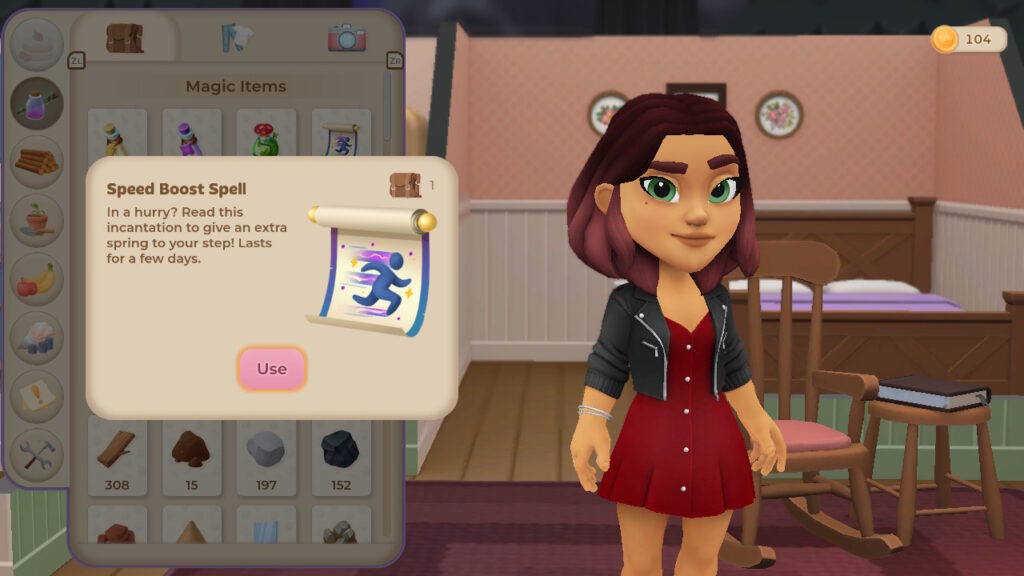


All of these quirky differences are what make Wylde Flowers truly stand out as having tried something fresh and new in their genre of choice. I appreciated being surprised by so many farming sim conventions being turned right on their head. Every moment of the adventure felt fun and memorable, even if some of the changes didn’t stick the landing. I cherished rushing between my cauldron and garden; mixing up potions as well as recipes; and using magic to squeeze a bit more productivity out of every day. By teasing well-worn genre conventions, Wylde Flowers consistently provides twists and turns that you won’t see in similar games.
Whatever rough patches Wylde Flowers may have, the story and characters genuinely captivated me in a way that delighted and surprised me. The game is fully voice acted and story-rich, with tear-jerking moments of awe, joy, and grief sprinkled throughout. It doesn’t shy away from difficult themes and each character is well-rounded and complicated in their own way.
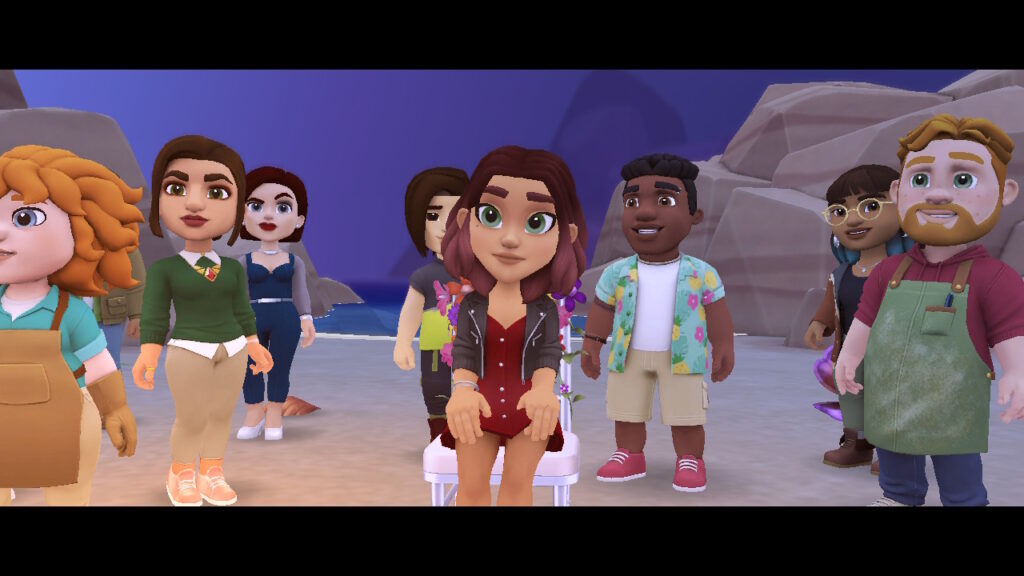
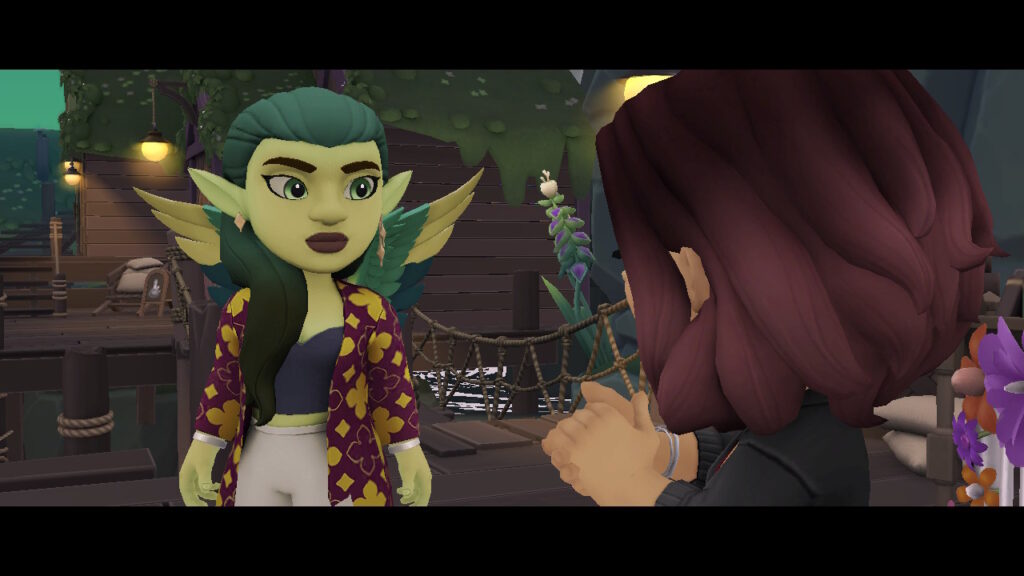
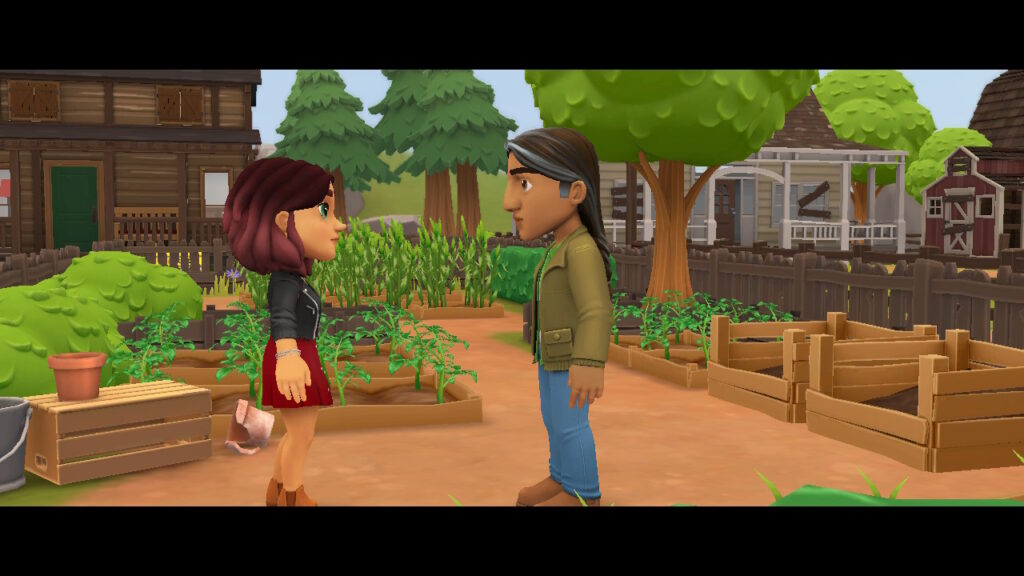
I wish I could spoil some elements of the story here because there are some surprises that are truly worth holding out for, even if the game doesn’t click with you at the start. Parts of the story that made me gasp aloud or wrung a tear from my eye. I hope you reach them yourself, without any further prodding from me, and I hope you enjoy every second of the journey getting there. Wylde Flowers is special. It’s special in a way that’s hard to put to words without ruining it for new players. It’s special in a way that’s worth experiencing firsthand.
So let me try to summarize this without giving anything away: If you relish expecting the unexpected, both in story and gameplay content… If you want diversity and inclusion in games that doesn’t feel shallow or preformative… If stories of family and community coming together to achieve great things resonate deeply with you… If you are keen to experience a story of hope and acceptance with tender moments that will pluck your heart strings raw… Then Wylde Flowers is the game for you.
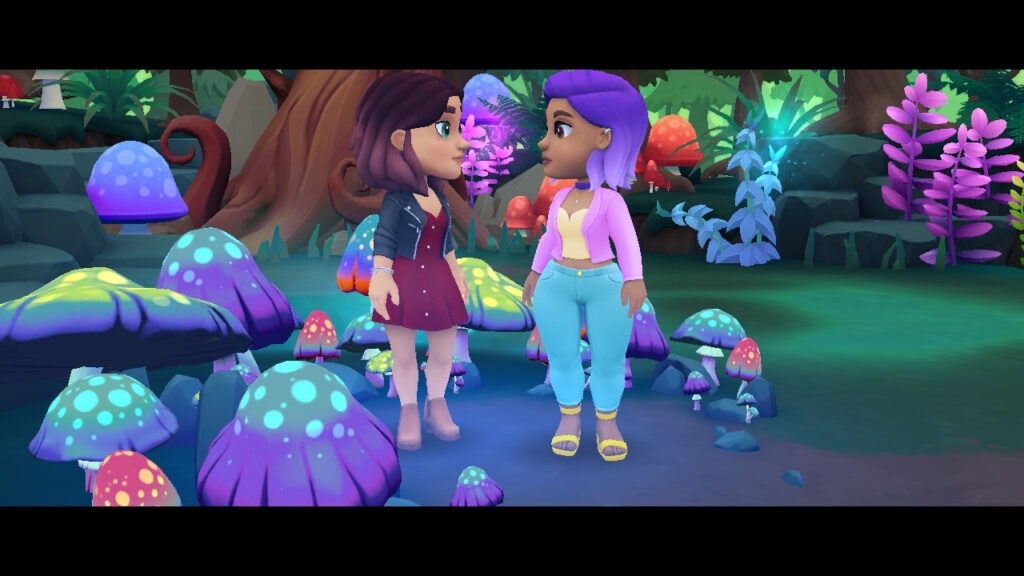
Summary
Who reads video game reviews anymore? Here is the TLDR:
Pros
- Diverse, fully voice-acted cast of characters
- Plays with farming sim conventions and stereotypes
- Emotional, engaging story about accepting others as they are
Cons
- Main story content only lasts one year (spring to spring)
- Unusual, unpredictable calendar system
- Low levels of character/farm customization options
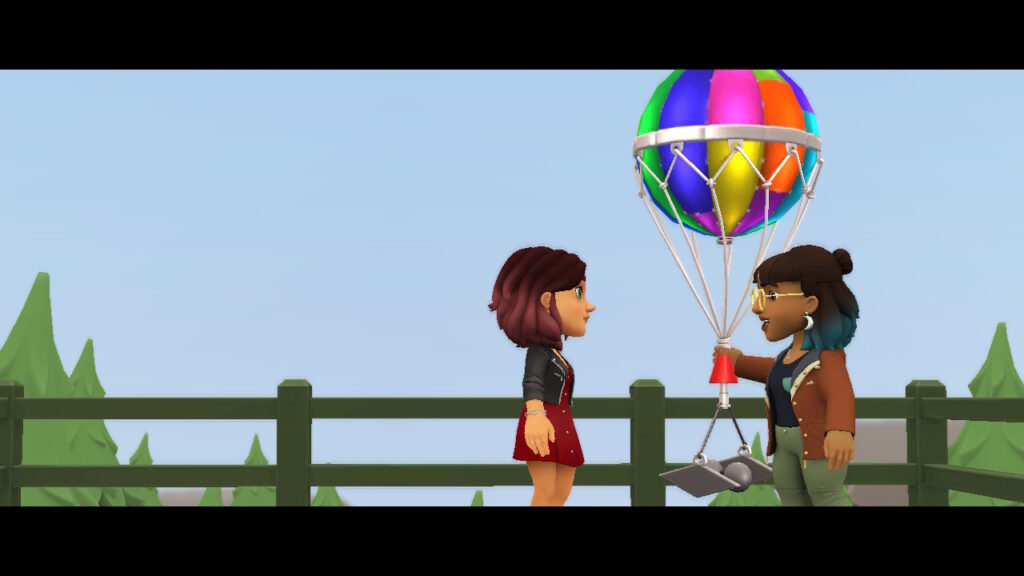
Conclusion
Wylde Flowers is a mesmerizing blend of enchanting storytelling, vibrant visuals, and deeply engaging gameplay that captivates from the first moment onward. The game weaves a tale of magic and mystery into a heartfelt narrative, creating an experience that is emotionally resonant throughout. The lush, bubbly art style and meticulously crafted environs breathe life into every corner of its whimsical world. Coupled with against-the-grain mechanics and rich, dynamic characters, Wylde Flowers is a must-play for anyone seeking a soulful and enchanting adventure, proving that magic truly does exist within the realm of indie video games.
I’d suggest buying Wylde Flowers at full price if it seems like a game you would enjoy. The additional updated content ensures you are getting the full bang for your buck, and the 60+ hour gameplay is worth every penny spent.
Who Wylde Flowers is for…
- Players who appreciate a diverse and inclusive cast
- Cozy gamers who are ready to shake up the farming sim formula
- Those who like magic/witchy elements in their farming games
- Apple Arcade users, who can play Wylde Flowers for free
Who Wylde Flowers is not for…
- Those looking for a traditional sandbox farming sim
- Folks who want a fully customizable main character and/or farm
- Critics who don’t like what I affectionately call “bobble-head art style” in games
Stay cozy, gamers!
If you liked Wylde Flowers, you might also like: My Time at Sandrock.
